 Libri di Wang Jen su Unilibro.it
)
Libri di Wang Jen su Unilibro.it
)
|
|
1911 |
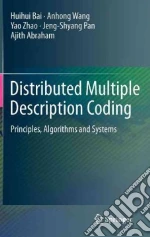 Title :
Distributed Multiple Description Coding
Title :
Distributed Multiple Description CodingAuthor: Bai Huihui, Wang Anhong, Zhao Yao, Pan Jeng-Shyang, Abraham Ajith Publisher: Springer-Verlag New York Inc This book examines distributed video coding (DVC) and multiple description coding (MDC), two novel techniques designed to address the problems of conventional image and video compression coding. Covering all fundamental concepts and core technologies, the chapters can also be read as independent and self-sufficient, describing each methodology in sufficient detail to enable readers to repeat the corresponding experiments easily. Topics and features: provides a broad overview of DVC and MDC, from the basic principles to the latest research; covers sub-sampling based MDC, quantization based MDC, transform based MDC, and FEC based MDC; discusses Sleplian-Wolf coding based on Turbo and LDPC respectively, and comparing relative performance; includes original algorithms of MDC and DVC; presents the basic frameworks and experimental results, to help readers improve the efficiency of MDC and DVC; introduces the classical DVC system for mobile communications, providing the developmental environment in detail. € 130,00
|
|
|
1910 |
 Title :
Koko Be Good
Title :
Koko Be GoodAuthor: Wang Jen Publisher: First Second Koko’s always got a new project cooking, even though they usually end in total disaster. This time will be different, Koko promises herself. This time, she’s decided to Be Good. But how can a girl whose greatest talent is causing trouble get her act cleaned up? If she’s being honest with herself, Koko isn’t even sure what “being good” means. Jon knows what being good means, and that’s why he’s going to Peru to support his girlfriend’s humanitarian mission. That’s good, all right, but is it what he wants? Jon has a promising future as a musician. Is he ready to give that up—maybe forever? Two very different people, both struggling for direction, find their way into each other’s lives in Jen Wang’s first graphic novel. Honest, wrenching, and incredibly funny, Koko Be Good is a tour-de-force debut about human nature and the inhuman efforts we make to find ourselves. € 18,20
|
|
|
2009 |
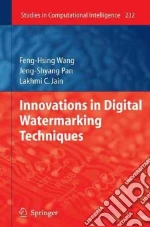 Title :
Innovations in Digital Watermarking Techniques
Title :
Innovations in Digital Watermarking TechniquesAuthor: Wang Feng-hsing, Pan Jeng-Shyang, Jain Lakhmi C. Publisher: Springer Verlag Information security and copyright protection are more important today than before. Digital watermarking is one of the widely used techniques used in the world in the area of information security.This book introduces a number of digital watermarking techniques and is divided into four parts. The first part introduces the importance of watermarking techniques and intelligent technology. The second part includes a number of watermarking techniques. The third part includes the hybrid watermarking techniques and the final part presents conclusions.This book is directed to students, professors, researchers and application engineers who are interested in the area of information security. € 174,20
|
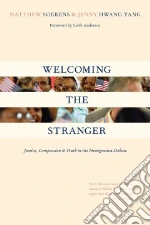 Title :
Welcoming the Stranger
Title :
Welcoming the StrangerAuthor: Soerens Matthew, Hwang Jenny, Anderson Leith (FRW) Publisher: Ivp Books € 15,50
|
|
2002 |
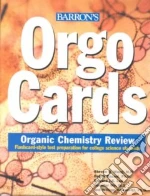 Title :
Orgocards
Title :
OrgocardsAuthor: Wang S. Q., Razani Babak, Lee Edward J. K., Wu Jennifer, Berkowitz William Publisher: Barrons Educational Series Inc For years, college students in pre-med courses, or majoring in biology, chemical engineering, and many other science courses have searched for a study aid of this kind, but have come up empty-handed. Now, Barron's has precisely what they've been seeking! OrgoCards is a set of more than 160 5 1/2' x 7' cards that summarize reactions and reaction mechanisms in organic chemistry. A sophisticated variation on the time-proven 'flashcard' method of study, the cards summarize organic reactions in 21 functional groups, such as alcohols and alkenes. Card number-one in each group outlines the group's physical and chemical properties. Each subsequent card explains a specific reaction, starting with a diagram of the reaction, and followed by a Keys section that summarizes the most important data related to this reaction. Following the list of Keys is a Notes section giving miscellaneous information. The back of each card contains a detailed reaction Mechanism, in both text and diagram forms. OrgoCards emphasize repetition and serve as aids to memorization to prepare students for examinations. These flashcard-style summaries highlight organic chemistry data that is vital for success on tests, fostering the student's comprehension in ways that standard textbooks cannot do. Organic chemistry is a required course in most college-level science programs, and knowledge of the subject is a requirement for success in admissions tests for medical, dental, and veterinary schools everywhere. Here is the learning tool that successful students will be turning to! € 20,40
|
|
|
1997 |
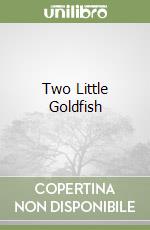 Title :
Two Little Goldfish
Title :
Two Little GoldfishAuthor: Giles Jenny, Mo Xiangyi (ILT), Wang Jingwen (ILT) Publisher: Rigby Education € 7,50
|
|
|
1992 |
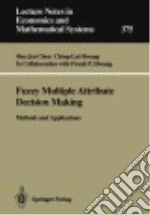 Title :
Fuzzy Multiple Attribute Decision Making
Title :
Fuzzy Multiple Attribute Decision MakingAuthor: Chen Shu-Jen, Hwang Ching-Lai, Hwang Frank P. (COL) Publisher: Springer Verlag This monograph is intended for an advanced undergraduate or graduate course as well as for researchers, who want a compilation of developments in this rapidly growing field of operations research. This is a sequel to our previous works: 'Multiple Objective Decision Making--Methods and Applications: A state-of-the-Art Survey' (No.164 of the Lecture Notes); 'Multiple Attribute Decision Making--Methods and Applications: A State-of-the-Art Survey' (No.186 of the Lecture Notes); and 'Group Decision Making under Multiple Criteria--Methods and Applications' (No.281 of the Lecture Notes). In this monograph, the literature on methods of fuzzy Multiple Attribute Decision Making (MADM) has been reviewed thoroughly and critically, and classified systematically. This study provides readers with a capsule look into the existing methods, their characteristics, and applicability to the analysis of fuzzy MADM problems. The basic concepts and algorithms from the classical MADM methods have been used in the development of the fuzzy MADM methods. We give an overview of the classical MADM in Chapter II. Chapter III presents the basic concepts and mathematical operations of fuzzy set theory with simple numerical examples in a easy-to-read and easy-to-follow manner. Fuzzy MADM methods basically consist of two phases: (1) the aggregation of the performance scores with respect to all the attributes for each alternative, and (2) the rank ordering of the alternatives according to the aggregated scores. € 132,80
|

|

|

|